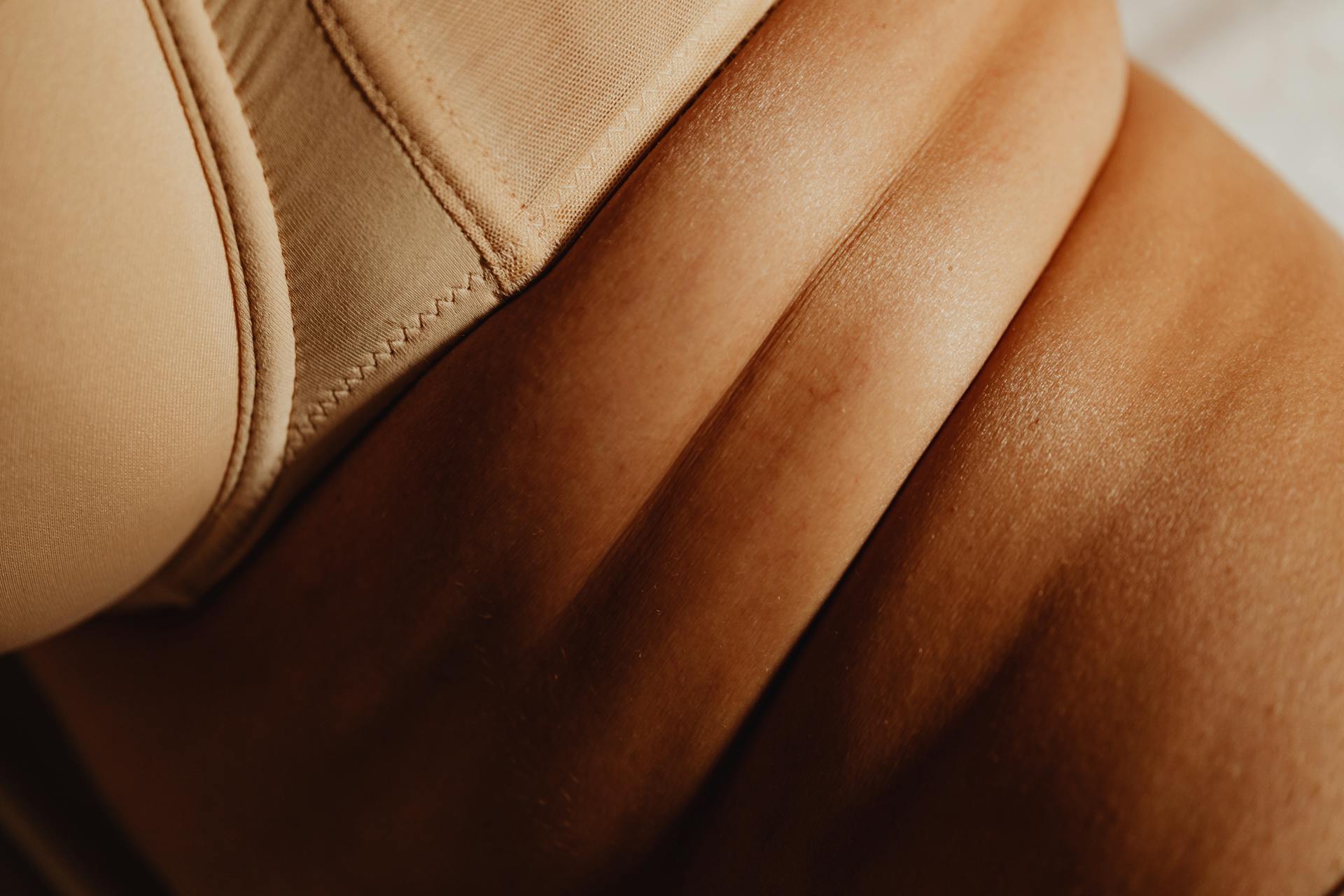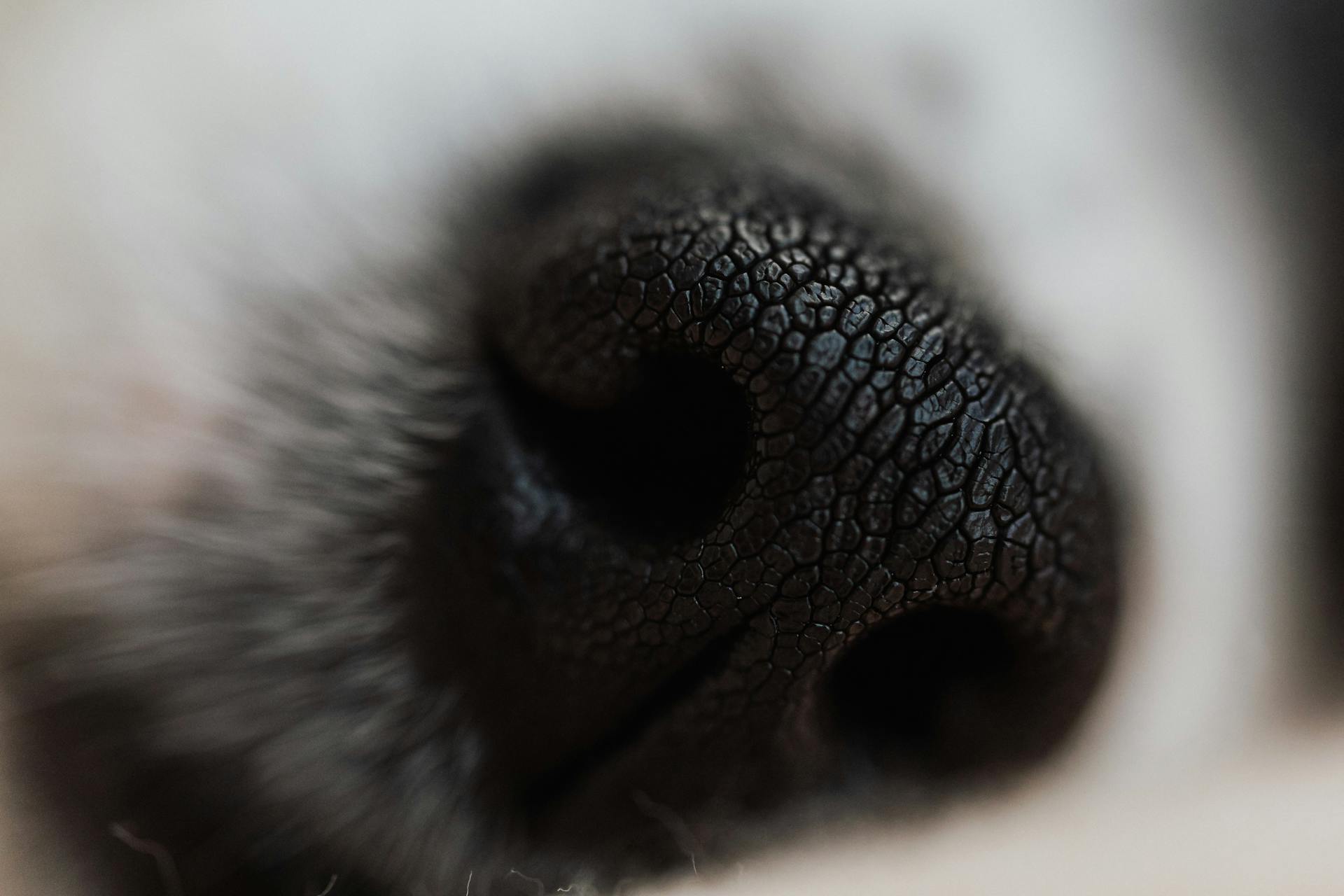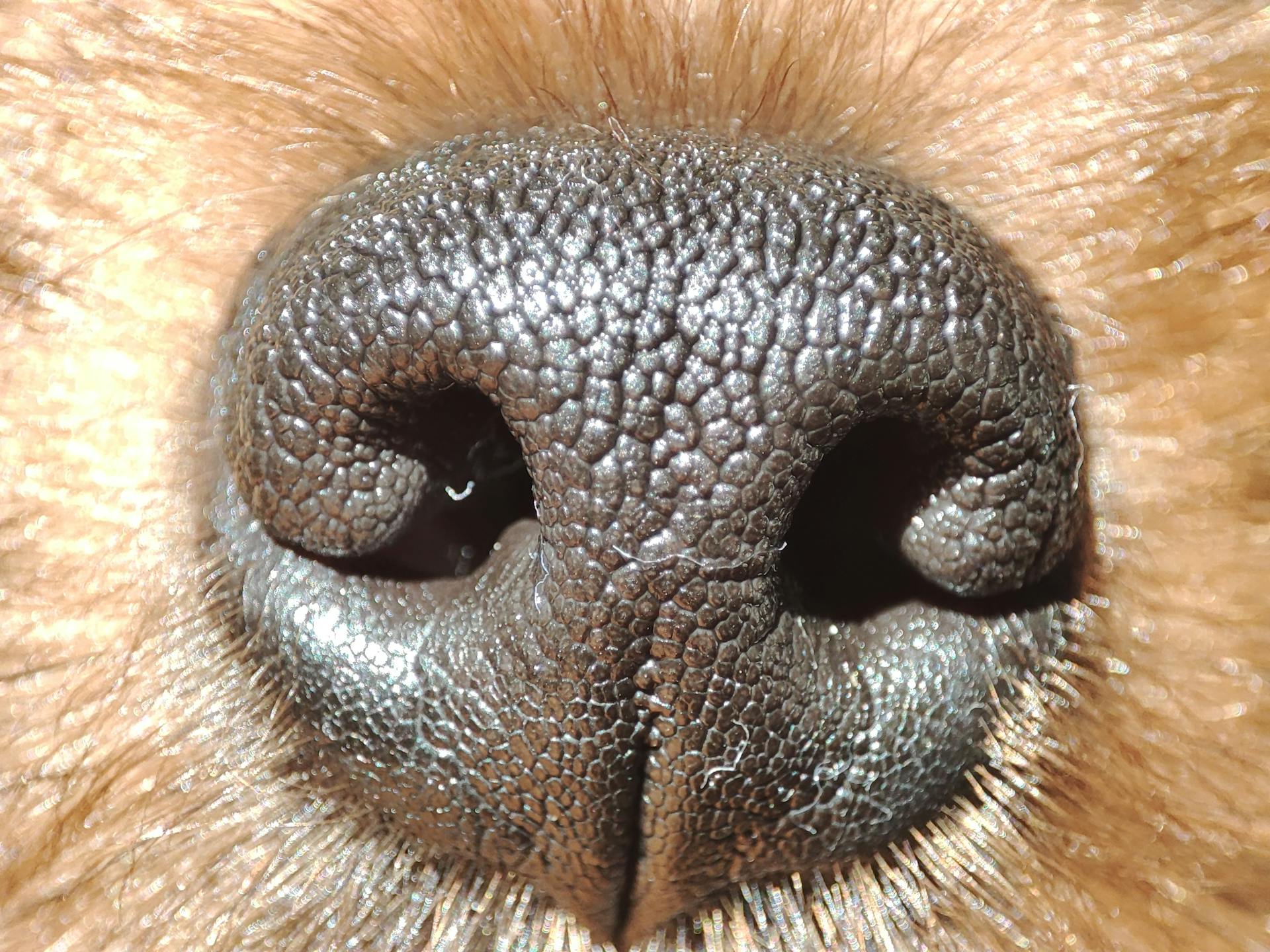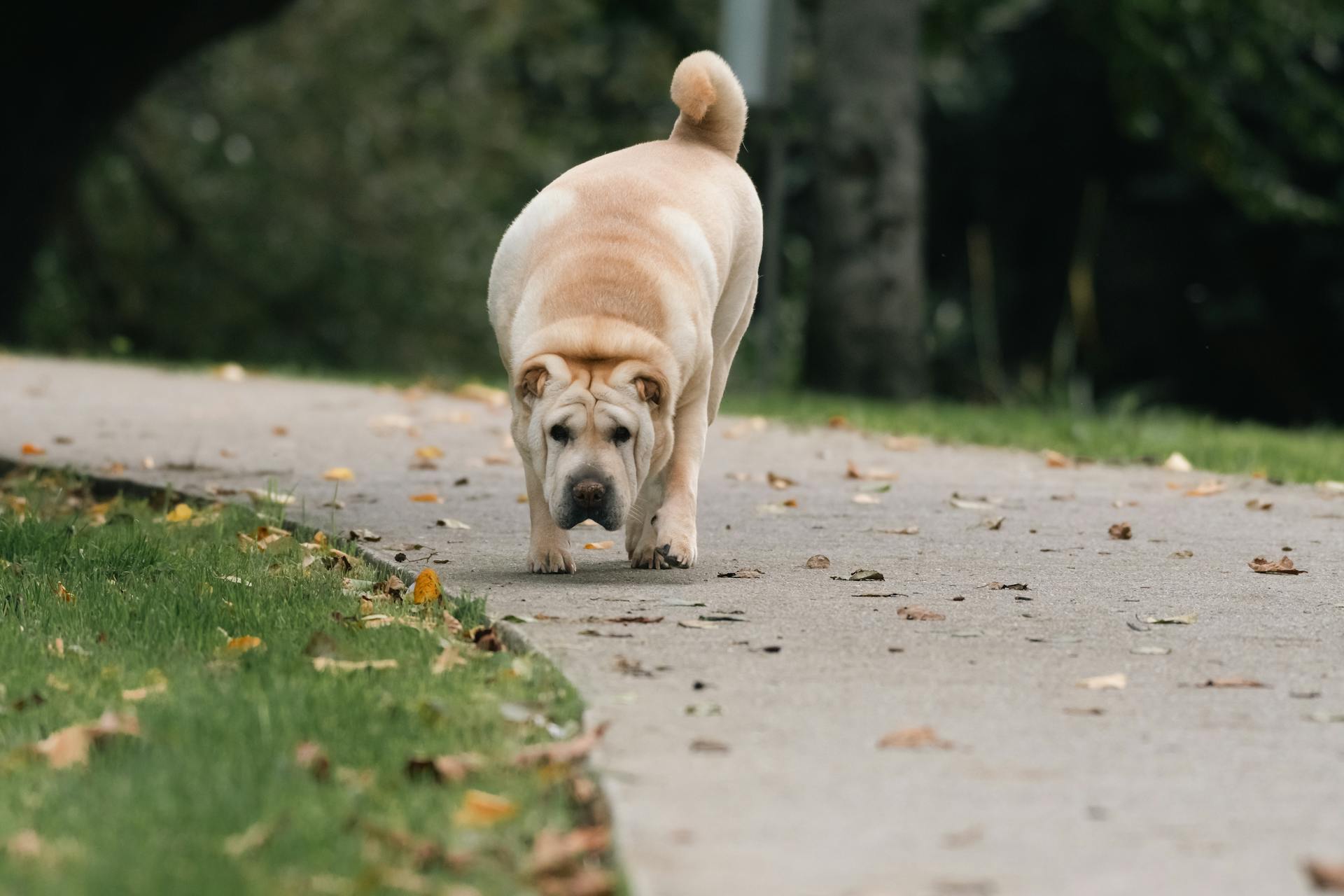
The Chinese Crested dog is a unique and loving companion, but like all breeds, they're not immune to health issues. Hypoglycemia, or low blood sugar, is a common problem in Chinese Crested dogs, especially puppies.
Their skin folds can be prone to skin infections, which can be painful and require prompt veterinary attention. Regular cleaning and drying of their skin folds is essential to prevent these infections.
Chinese Crested dogs are also susceptible to dental problems, including tooth decay and gum disease. Regular dental care, such as brushing their teeth, is crucial to maintaining good oral health.
Their thin coat means they can be sensitive to extreme temperatures, so they need protection from the sun and cold. Providing them with a warm and comfortable environment is vital to their overall health and happiness.
On a similar theme: Chinese Crested Dog Origin
Chinese Crested Dog Health Issues
Chinese Crested dogs are generally healthy and can live up to 18 years, but they do have some health issues to be aware of.
Regular checkups and a healthy lifestyle can help minimize the risk of these issues. The Orthopedic Foundation of America recommends that Chinese Cresteds be screened for certain health conditions before breeding, including eye problems, patellar luxation, heart problems, primary lens luxation, progressive retinal atrophy, congenital deafness, hip dysplasia, and Legg-Calvé-Perthes disease.
It's essential to ask breeders about the results of any screening tests they've run on the puppy's mother and father before purchasing a Chinese Crested puppy.
Here are some common health issues to watch out for in Chinese Crested dogs:
- Change in appetite or water consumption
- Tartar build-up, bad breath, red gums, or broken teeth
- Itchy skin (scratching, chewing or licking), hair loss
- Lethargy, mental dullness, or excessive sleeping
- Fearfulness, aggression, or other behavioral changes
Hip and Joint Issues
Hip and joint issues are a common concern for Chinese Crested owners.
Hip dysplasia, an inherited disease, causes joints to develop improperly and can lead to arthritis.
Stiffness in the hips or elbows may become a problem for your Crested, especially as he matures.
Regular checkups and a healthy lifestyle can help minimize the risk of these issues.
Additional reading: Hip Score

The Orthopedic Foundation of America recommends screening for hip dysplasia prior to breeding.
Here are some potential health issues related to hip and joint problems in Chinese Cresteds:
- Hip dysplasia
- Elbow dysplasia
- Patellar luxation
- Legg-Calvé-Perthes disease
In severe cases, surgery may be needed to realign the kneecap or to address hip dysplasia.
Keep in mind that overweight dogs may develop arthritis years earlier than those of normal weight, causing undue pain and suffering.
Hip Dysplasia
Hip dysplasia is a serious health issue that can affect your Chinese Crested dog. It's an inherited disease that causes the joints to develop improperly, leading to arthritis.
This can cause your dog to become stiff, especially in his elbows or hips. You may notice lameness in his legs or difficulty getting up from lying down. The sooner you catch the arthritis, the better it is for your dog's comfort and pain level.
Regular checkups with your veterinarian can help identify issues early on. They may take X-rays of your dog's bones to identify any problems. In severe cases, surgery may be a good option to minimize your dog's discomfort and pain.
Overweight dogs are more likely to develop arthritis due to hip dysplasia, so keeping your Chinese Crested at a healthy weight is crucial. This can help extend his lifespan and reduce the risk of painful health issues.
Knee Problems
Knee problems can be a concern for Chinese Crested owners. Patellar luxation, where the kneecap slips out of place, is a common issue in the breed.
You might notice your Crested running along and suddenly picking up a back leg, skipping or hopping for a few strides, and then kicking their leg out sideways to pop the kneecap back in place.
If the problem is mild and involves only one leg, your friend may not require much treatment beyond arthritis medication. In some cases, the kneecap can pop back into place on its own.
However, if symptoms are severe, surgery may be needed to realign the kneecap and keep it from popping out of place.
Here are some common knee problems to be aware of in Chinese Cresteds:
- Patellar luxation
- Legg-Calvé-Perthes disease
Skin and Coat Issues
Skin and coat issues are a common concern for Chinese Crested owners. Hairless areas of skin require special protection from the sun and cold temperature.
Dry skin, comedones, and other skin problems can develop in hairless Chinese Cresteds even with extra skin care. Regular moisturizing is essential to prevent skin damage.
Powderpuff Chinese Cresteds have a double coat that requires regular brushing to prevent painful matting. Brushing is necessary at least a few times a week to keep their coat looking its best.
The long lifespan of Chinese Cresteds, typically 13-18 years, means that skin and coat issues will be a long-term commitment for owners.
Additional reading: How to Prevent Twisted Stomach in Dogs
Infections and Parasites
Hairless Chinese Crested Dogs are susceptible to bacterial and viral infections, such as parvo, rabies, and distemper. These infections are preventable through vaccination, which we will recommend based on the diseases we see in our area, her age, and other factors.
All kinds of worms and bugs can invade your Hairless’s body, inside and out. Everything from fleas and ticks to ear mites can infest her skin and ears.
Hookworms, roundworms, heartworms, and whipworms can get into your Hairless’s system in a number of ways: drinking unclean water, walking on contaminated soil, or being bitten by an infected mosquito. Some of these parasites can be transmitted to you or a family member and are a serious concern for everyone.
For your canine friend, these parasites can cause pain, discomfort, and even death, so it’s essential to test for them on a regular basis. We’ll also recommend preventive medication as necessary to keep her healthy.
Keeping your Chinese Crested’s ears clean and the canals free of debris is essential for preventing ear infections. Call your vet if you notice any redness or odor in your pup’s ears, as this could be a sign of an infection.
Expand your knowledge: Pit Bulls Ears
Coat Care and Grooming
Powderpuff Chinese Cresteds have a beautiful double coat that requires regular attention to prevent painful matting. You'll need to brush your powderpuff at least a few times a week.
Regular brushing will help keep your powderpuff's coat looking its best. A long, silky topcoat needs regular maintenance to prevent matting and tangling.
Powderpuffs need to visit the groomer for a trim when their hair grows too long. This will help keep their coat healthy and prevent any potential issues.
Both hairless and powderpuff Chinese Cresteds require involved care, including regular brushing and professional grooming sessions. This will help keep their coat and skin healthy.
As a pet parent, it's essential to keep up with your Crested's grooming needs, whether they're a hairless or a powderpuff. This will help ensure your furry friend stays happy and healthy for years to come.
For more insights, see: How to Prevent Diabetes in Dogs
Genetic and Congenital Issues
Chinese Crested dogs are generally healthy, but they can be prone to certain genetic and congenital issues. These issues can be minimized with regular checkups and a healthy lifestyle.
The Orthopedic Foundation of America recommends that Chinese Cresteds be screened for eye problems, patellar luxation, heart problems, primary lens luxation, progressive retinal atrophy, congenital deafness, hip dysplasia, and Legg-Calvé-Perthes disease before breeding.
Recommended read: Preventative Care Keeping Your Pet Healthy Year-Round
Some common genetic issues in Chinese Crested dogs include cleft lip or palate, which is an opening in the lip or roof of the mouth. This condition can be mild or severe, and may require surgical repair. Persistent Pupillary Membrane is another condition that can affect Chinese Crested dogs, where small strands of tissue remain attached to the iris.
Here are some genetic issues that can affect Chinese Crested dogs:
- Cleft lip or palate
- Persistent Pupillary Membrane
- Eye problems
- Patellar luxation
- Heart problems
- Primary lens luxation
- Progressive retinal atrophy
- Congenital deafness
- Hip dysplasia
- Legg-Calvé-Perthes disease
It's essential to have your Chinese Crested dog checked for these conditions regularly, especially during their first puppy exam. If you notice any unusual lumps or bumps, be sure to have them checked out by a veterinarian.
Birth Defects and Abnormalities
Chinese Crested dogs can be prone to various birth defects and abnormalities, which can be detected with regular checkups and screenings.
Some common birth defects in Chinese Cresteds include eye problems, such as Persistent Pupillary Membrane, where small strands of tissue remain attached to the iris.
These tissue bits usually don't hurt or impede vision, but occasionally they can cause problems.
Chinese Cresteds are also more likely to be born with a cleft lip or palate, which is an opening in the lip or the roof of the mouth.
Mild cases may not require any treatment, but more serious defects require surgical repair to prevent complications.
Teeth abnormalities, such as malocclusion, oligodontia, and misaligned teeth, are also common in Chinese Cresteds.
These conditions can be genetically induced and can cause problems, but can usually be corrected with braces or extractions.
Here are some common birth defects and abnormalities found in Chinese Cresteds:
- Eye problems, such as Persistent Pupillary Membrane
- Cleft lip or palate
- Teeth abnormalities, such as malocclusion, oligodontia, and misaligned teeth
Regular checkups and screenings can help detect these birth defects and abnormalities, ensuring your Chinese Crested puppy receives the necessary care and treatment.
Mast Cell Tumor
Mast Cell Tumor is a particularly nasty type of skin cancer.
It's found more often in Hairless Chinese Crested Dogs, and the sooner it's surgically removed the better.
Mast cell tumors often look just like other kinds of skin lumps and lesions.
Some of these lumps are harmless, while others can be very serious.
All suspicious lumps should be tested, and any questionable lump should be surgically removed as soon as possible.
Many cancers are cured by surgically removing them, so early detection and removal is critical.
Surgically removing mast cell tumors can be a highly effective way to treat the cancer.
However, it's essential to act quickly, as the cancer can spread if left untreated.
Early detection and removal can make all the difference in the outcome.
If you're a Chinese Crested Dog owner, be sure to keep an eye out for any unusual lumps or lesions on your pet's skin.
Additional reading: Canine Cancer Awareness Month
Epilepsy
Epilepsy is a common issue that affects dogs, and it's essential to understand the types and causes of seizures in our furry friends.
There are three types of seizures in dogs: reactive, secondary, and primary. Reactive seizures are caused by the brain's reaction to a metabolic problem like low blood sugar, organ failure, or a toxin.
Secondary seizures are the result of a brain tumor, stroke, or trauma. If no other cause can be found, the disease is called primary, or idiopathic epilepsy.
This problem is often an inherited condition, with Hairless Chinese Crested Dogs commonly afflicted. If your friend is prone to seizures, they will usually begin between six months and three years of age.
An initial diagnostic workup may help find the cause. Lifelong medication is usually necessary to help keep seizures under control, with periodic blood testing required to monitor side effects and effectiveness.
If your dog has a seizure, carefully prevent him from injuring himself, but don't try to control his mouth or tongue. It won't help him, and he may bite you accidentally!
Readers also liked: Pet Poison Control Center
Emergency and First Aid
As a responsible dog owner, it's essential to know the signs of emergencies in your Chinese Crested dog. If you notice any of the following, seek medical care immediately.
Scratching or shaking the head, tender ears, or ear discharge can be a sign of an ear infection. I've seen it happen to a friend's dog, and it was a relief to get it treated quickly.
Inability or straining to urinate, or discolored urine, are also red flags. These symptoms can indicate a urinary tract infection or even kidney stones.
Cloudiness, redness, itching, or any other abnormality involving the eyes is a concerning sign. If you notice anything unusual, don't hesitate to take your dog to the vet.
General reluctance to run or play can be a sign of a underlying health issue. Keep an eye out for changes in your dog's behavior.
Increasing hip pain in dogs under a year old is a serious concern. This could be a sign of hip dysplasia or another condition that needs prompt attention.
Any abnormal shaking, trembling, or excessive involuntary tremors are signs of a potential neurological issue. If you notice these symptoms, get your dog to the vet ASAP.
Easily startled, no reaction to unseen sounds, can be a sign of hearing loss or another issue. Keep an eye out for changes in your dog's behavior.
Intriguing read: Dog Health Symptoms

Skin redness, irritation, or pain when petting are all signs that something's amiss. If you notice any of these symptoms, take your dog to the vet right away.
Here are the emergency signs in a list:
- Scratching or shaking the head, tender ears, or ear discharge
- Inability or straining to urinate; discolored urine
- Cloudiness, redness, itching, or any other abnormality involving the eyes
- General reluctance to run or play
- Increasing hip pain at less than a year old
- Any abnormal shaking, trembling, or excessive involuntary tremors
- Easily startled, no reaction to unseen sounds
- Skin redness, irritation, or pain when petting
General Health and Wellness
Chinese Crested dogs are generally healthy and can live up to 18 years, but they do have some specific health concerns to be aware of. Regular checkups and a healthy lifestyle can help minimize the risk of these issues.
To reduce the incidence of health problems in the breed, it's recommended that Chinese Cresteds be screened for certain health conditions, including eye problems, patellar luxation, heart problems, and hip dysplasia.
Here are some common health issues that can affect Chinese Crested dogs:
- Eye problems
- Patellar luxation
- Heart problems
- Primary lens luxation
- Progressive retinal atrophy
- Congenital deafness
- Hip dysplasia
- Legg-Calvé-Perthes disease
Brushing your dog's teeth daily can help prevent periodontal disease, and regular bathing and application of lotion can help keep their skin healthy.
Nutritional Tips
A well-balanced and nutritious diet is essential for your Chinese Crested's overall health and wellness. Your dog needs a high-quality diet appropriate for her age, and it's best to stick to a consistent feeding schedule.
Supervise your pet as you would a toddler, and keep an eye on what she's eating. Don't give her people food, as it can be detrimental to her health.
Here are some key nutritional tips to keep in mind:
- Feed a high-quality diet appropriate for your dog's age.
- Keep your dog's diet consistent.
- Don't give your dog supplements unless your vet recommends them.
Regular exercise is also crucial for your Chinese Crested's physical and mental health. However, don't overdo it at first, as they can be sensitive to overexertion.
Spay or Neuter
Spaying or neutering your Crested is one of the best things you can do for their health. It decreases the likelihood of certain types of cancers and eliminates the possibility of your pet becoming pregnant or fathering unwanted puppies.
Spaying or neutering also gives us a chance to identify and address some of the diseases your dog is likely to develop. This can be done while your pet is under anesthesia, making it a convenient and easy time to take care of any necessary procedures.
Routine blood testing prior to surgery helps us to identify and take precautions for common problems that increase anesthetic or surgical risk. This is a crucial step in ensuring your pet's safety and well-being.
Having your Crested spayed or neutered can also be a good opportunity to address other health issues, such as hip X-rays or a puppy tooth extraction.
Frequently Asked Questions
What is the life expectancy of a Chinese Crested dog?
The average life expectancy of a Chinese Crested dog is 13 to 18 years. With proper care, they can live a relatively long life as a beloved pet.
What is the mutation in the Chinese Crested dog?
The Chinese Crested dog is affected by an autosomal recessive mutation in the ADAMTS17 gene, which causes primary lens luxation. This genetic mutation can lead to eye problems in the breed.
Why does my Chinese Crested smell?
Seborrhea, a common skin disease in Chinese Cresteds, can cause strong body odor due to its oily or dry forms
Sources
- https://harvestplazaanimalhospital.com/client-resources/breed-info/chinese-crested-hairless/
- https://ozarkveterinaryclinicllc.com/client-resources/breed-info/chinese-crested-powderpuff/
- https://tcah.vet/client-resources/breed-info/chinese-crested-hairless/
- https://www.richmondveterinaryhospital.com/client-resources/breed-info/chinese-crested-hairless/
- https://www.petmd.com/dog/breeds/chinese-crested
Featured Images: pexels.com


